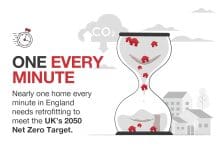39% of people are more likely to buy sustainable homes after the energy crisis, Turley has found
Potential buyers are seeking more sustainable homes after the energy crisis, a recent survey by planning and development consultancy Turley has found.
The rising cost of energy has also made people more willing to purchase a new build house with improved eco-friendly technology, according to the research.
More sustainable homes after the energy crisis are a priority
More than a third (39%) of potential house buyers would now look to buy a sustainable eco-friendly house that’s cheaper to run as a result of the energy crisis over the last 12 months.
The findings come from data analysis, which looked at consumer attitudes towards purchasing sustainable homes.
After location, the survey showed that low upkeep costs are the second most important factor when buying a property, and more than a third (35%) of consumers would now be willing to pay more for a new build house or flat to benefit from enhanced energy efficiency features.
The most popular eco features that house buyers would look for include high performance insulation (71%), high-specification glazing (65%) and solar panels (63%).
There is still some confusion about eco-friendly technology, such as heat pumps
Almost half (47%) of those surveyed also said a heat pump would appeal to them.
However, one in five (20%) admit to not knowing what a heat pump is, despite the Government banning gas boilers in all new builds from 2025, effectively mandating heat pumps in new homes.
Similarly, despite electric vehicle charging points having been made mandatory in all new build homes to support the rollout of EVs, 43% of people say it would still not appeal to them when house hunting.
EPC ratings and cost of buying are still significant hurdles to a sustainable homes revolution
The UK’s residential sector currently accounts for 20 per cent of the UK’s total carbon emissions.
Improving the EPC rating of homes is key to reducing that. However, only 42per cent of UK homes have an EPC rating of C or above.
Despite people’s appetite for more energy efficient homes, the cost of living crisis has significantly dented consumers’ ability to afford to move or purchase a property.
A third (32%) of those surveyed admitted that current financial challenges have made them less likely to buy or move home in the next five years.
A great incentive for housebuilders
Barny Evans, director, sustainability at Turley, said: “New homes built during the 2020s will change more than in the previous 40 years. Heat pumps, electric vehicle chargers, much better insultation and solar power will be standard on almost all homes very soon. These features, as well as improving environmental performance, can reduce bills substantially.
“Although there is still a way to go, our survey shows a growing awareness and appreciation of these features. That is a great incentive for housebuilders to embrace them and showcase them on new developments.”














